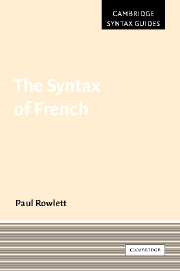1 - Introduction
Published online by Cambridge University Press: 18 December 2009
Summary
I start by looking at the external history of French (§1.1), the distribution of the language around the world today (§1.2), the internal syntactic history of the language and the major typological features of the modern language (§1.3). In §1.4 I give a taste of what's syntactically interesting about French, both theoretically and cross-linguistically. Finally, I provide a brief overview of the syntactic framework in which the rest of the book is couched (§1.5).
Development and spread of French
Like all Romance languages, French has its roots in Latin, more particularly the vernacular spoken by the Romans who, in the first and second centuries BCE, colonised Gaul, at the time a predominantly Celtic-speaking area. Over the next five hundred years Celtic gradually gave way to Latin, the language of power, which therefore survived the demise of the Roman Empire towards the end of the fifth century CE. However, as was the case with varieties spoken in other regions of the Empire, the variety of Latin spoken in Gaul had begun to diverge from the Latin of Rome, and this process of divergence accelerated following the loss of the centralising influence of the Empire. Thus, while written Latin remained stable, the vernacular did not.
One major factor determining how the Latin of Gaul developed after the fall of Rome was the invasion of Germanic speakers, who by the end of the sixth century CE controlled most of Gaul. In contrast to the Romans, though, these Visigoths, Burgundians and Franks didn't impose their language on the indigenous peoples.
Information
- Type
- Chapter
- Information
- The Syntax of French , pp. 1 - 13Publisher: Cambridge University PressPrint publication year: 2007
